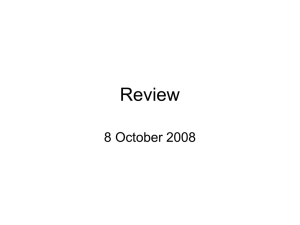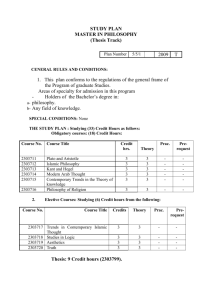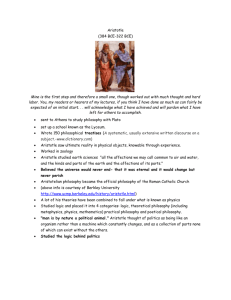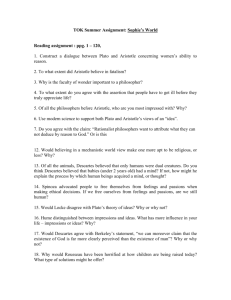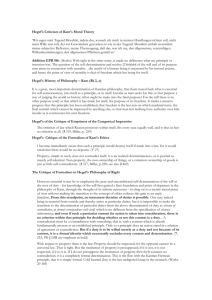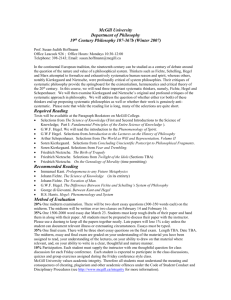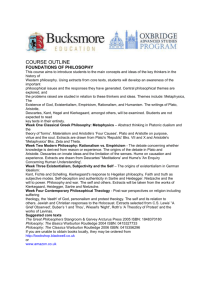LA 3003 Freedom is to Learn outline 15-16
advertisement
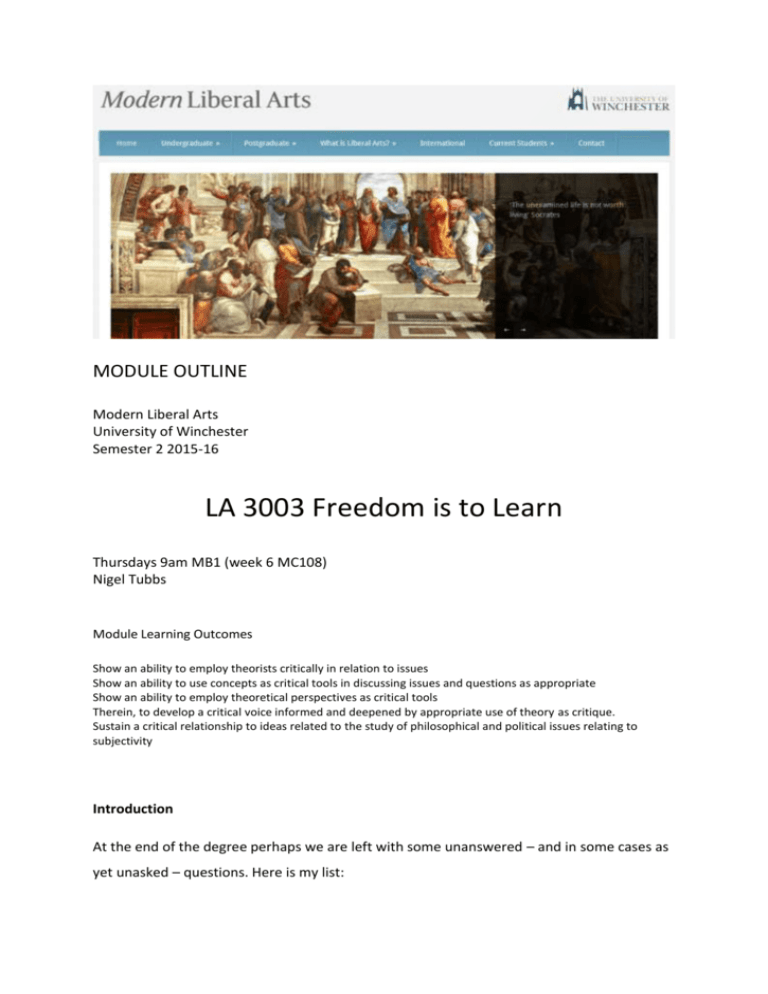
MODULE OUTLINE Modern Liberal Arts University of Winchester Semester 2 2015-16 LA 3003 Freedom is to Learn Thursdays 9am MB1 (week 6 MC108) Nigel Tubbs Module Learning Outcomes Show an ability to employ theorists critically in relation to issues Show an ability to use concepts as critical tools in discussing issues and questions as appropriate Show an ability to employ theoretical perspectives as critical tools Therein, to develop a critical voice informed and deepened by appropriate use of theory as critique. Sustain a critical relationship to ideas related to the study of philosophical and political issues relating to subjectivity Introduction At the end of the degree perhaps we are left with some unanswered – and in some cases as yet unasked – questions. Here is my list: Will the poor always be with us? What is a liberal arts education if it still holds to first principles? What is a liberal arts education if it no longer aspires to first principles? Can virtue still be taught/could it ever be taught? Is truth unknowable, and if so why? Is there anything new under the sun, or are we at an end which can only repeat? What does Hegel think Kant got wrong, and what does Adorno think Hegel got wrong? Can thought think itself (noesis noeseos) as Aristotle supposed? Is the West’s idea of truth in some sense ‘propertied’? What, if anything, is the difference between ancient and modern ‘know thyself’? What of ‘God’ in all this… for example, for Kierkegaard? Finally, might we speak of a new kind of logic, and educational logic, one that laughs and cries, and which is vulnerable to having neither a beginning nor an end? What follows now is a list of sessions, some with specific reading, some with just authors, or books, that stand for an argument within a debate. I want us to spend the first session talking about where we feel we are in relation to some of the questions listed above. I’ll have three short pieces to accompany this. NOTE: essays in on Thursdays in weeks 6 and 11 Week 1 Three Responses to the Modern Readings: Weber, M. (1985) ‘Science as a Vocation’ (Wissenschaft als Beruf) in From Max Weber: Essays in Sociology, ed. HH Gerth and CW Mills, London, RKP. Braidotti, R. (2013) The Posthuman, Cambridge, Polity Press. Said, E.W. (2004) Humanism and Democratic Criticism, New York, Columbia University Press. Week 2 and thereafter, I am hoping our discussions in week 1 will enable us to shape the module to some extent. I will speak of the questions above that I think we might address, but we’ll also see how the discussion goes in week 1. What follows then, are some examples of sessions with readings, but nothing is definitive… (except, perhaps, education for its own sake). First Principles, Prime Mover, infinite regression Readings: Plato, (1997) Phaedrus, in Plato Complete Works, Indianapolis, Hackett Publishing, p524 (§ 245)) Plato, (1970) The Laws, London, Penguin, p. 424; 894e-895a. Aristotle, Physics, I.1. 184a10-15; II.3. 194b17-23; VIII.5. 256a12256b3; VII.1. 242a50-4; III.4. 203b 6-15; Aristotle, (1984b) Metaphysics, 1072a19-1072b31. Aristotle, (1984b) Metaphysics, 1005b18-34 Aristotle, (1984b) Metaphysics, 1074b15-34. Aristotle, (1984) The Complete Works of Aristotle volume 2, ed. J. Barnes, Oxford: Oxford University Press, p. 2392 Aquinas, (1998) Selected Writings, trans. R. McInerny, London: Penguin, pp. 42-3; Aquinas, T. (1975) Summa Contra Gentiles Book 3: Providence Part I, trans V.J. Bourke, Notre Dame: University of Notre Dame Press, p. 101. Plotinus, (1991) The Enneads, London, Penguin, II. 9. 1, p. 110 take out… put in God as not knowing himself. Bacon, R. (1928) Opus Majus, Philadelphia: University of Pennsylvania Press, p. 797-8. Duns Scotus, (1987) Philosophical Writings, trans. A. Wolter, Indianapolis: Hackett Publishing Company,) p. 39. R. Descartes, Meditations on First Philosophy in The Philosophical Writings of Descartes vol. 2, trans. J. Cottingham, R. Stoothoff & D. Murdoch, (Cambridge, Cambridge University Press, 1984), p. 29. Potential/Immediacy and Actuality/mediation Reading: Aristotle, the Metaphysics 1074b 34 Avicenna, Metaphysics of Healing, p. 142 Hegel, Phenomenology of Spirit §808 Hegel, Philosophy of Right, p. 13. Hyppolite, Genesis and Structure of Hegel’s Phenomenology of Spirit, p. 166. Verene, Hegel’s Recollection, p. 3 Peter Osborne, ‘Hegelian Phenomenology and the Critique of Reason and Society’, Radical Philosophy 32 (Autumn 1982), 8-15; p. 14. Caygill, H. (1991) ‘Affirmation And Eternal Return In The Free-Spirit Trilogy’ in Nietzsche and Modern German Thought, ed. Keith AnsellPearson, London: Routledge, pp. 226, 234-5. Heidegger, Being and Time, pp. 377 & 436. Rose, Dialectic of Nihilism, pp. 58 & 82-3. Derrida, Limited Inc. p. 53 Deleuze, difference and repetition, p. 263. Zizek, Less Than Nothing, p. 502. liberal arts education with first principles Reading: Paideia? Isocrates, ‘Panegyricus’ in Isocrates with an English Translation in three volumes, by George Norlin, Ph.D., LL.D. Cambridge, MA, Harvard University Press; London, William Heinemann Ltd. 1980; 47-50. http://www.perseus.tufts.edu/hopper/text?doc=Perseus%3Atext%3A 1999.01.0144%3Aspeech%3D4%3Asection%3D47 Isocrates, ‘Nicocles or the Cyprians,’ in Isocrates with an English Translation in three volumes, by George Norlin, Cambridge, MA, Harvard University Press; London, William Heinemann Ltd. 1980, 1-9. http://www.perseus.tufts.edu/hopper/text?doc=Perseus%3Atext%3A 1999.01.0144%3Aspeech%3D3 Isocrates, ‘Antidosis,’ in Isocrates with an English Translation in three volumes, by George Norlin, Cambridge, MA, Harvard University Press; London, William Heinemann Ltd. 1929, vol. II, pp. 327-9. Cicero, (1967) De Oratore Books 1 & 2, trans. E.W Sutton, London: Heinemann, i.71-8, ii. 5-7. Bicknell, J. (2002) ‘Self-Scrutiny in Maimonides’ Ethical and Religious Thought,’ Laval théologique et philosophique, Volume 58, Number 3, October 2002, p. 531-543, opening section on Aristotle. http://www.erudit.org/revue/ltp/2002/v58/n3/000631ar.html?lang=en Handout: Antiquity: finding virtue in necessity Tubbs, N. (2004) ‘Theory and Practice: the Politics of Philosophical Character,’ Journal of Philosophy of Education, Vol. 38, No. 4, pp. 5536. Handout: the four cardinal virtues Seneca, (1997) ‘On Tranquillity of Mind’ in On the Shortness of Life, London: Penguin. http://thriceholy.net/Texts/Tranquility.html Stoics Marcus Aurelius, (1964) Meditations, Harmondsworth: Penguin, Books II and IV, and pp. 86, 93, 108, 132. Epictetus, (2004) Discourses, pp. 28-9, 82, 90. Epicurus, (1994) The Epicurus Reader, Indianapolis: Hackett Publishing Company, pp. 30-1. Sextus Empiricus, (2000) Outlines of Scepticism, Cambridge: Cambridge University Press, pp. 3-11, 51-2, 57-8, 72. At peace (tranquillity) Plotinus, (1991) The Enneads, London: Penguin, VI. 9.; Pseudo-Dionysius, (1987) Pseudo-Dionysius The Complete Works, NJ: Paulist Press, pp. 105 & 108-9. Augustine, (1972) City of God, Harmondsworth: Penguin, pp. 566-7, 590-1, 870-4; Augustine, (1998) Confessions, Oxford: Oxford University Press, p. 127. Wider reading: Richard of St Victor, (1979) The Twelve Patriarchs, New York, Paulist Press. Gillis, D. (2015) Reading Maimonides’ Mishneh Torah, Oregan, The Littleman Library of Jewish Civilization, pp. 83-4. Humanism in the Renaissance? Newman, J.H. (1931) The Idea of a University, London, Longman, Green and Co, pp. 177-8 http://www.gutenberg.org/files/24526/24526-pdf.pdf Proctor, R.E. (1998) Defining the Humanities, Bloomington, Indiana UP, pp. 104-5, 109-110, 172-3, 200-1. Liberal arts without first principles Reading: Sim, S. (1999) Derrida and the End of History, Cambridge, Icon Books, pp. 12-16. Nietzsche, F. (1968) Genealogy of Morals, in Basic Writings of Nietzsche, ed. W. Kaufmann, New York, The Modern Library, p. 521 (sec 16). Deleuze, G. (2001) difference and repetition, London, Continuum, p. xix. Fanon, F. (2001) The Wretched of the Earth, London, Penguin, conclusion, pp. 251-5. Bernasconi, ‘Kant as an unfamiliar source of racism,’ in Ward, J.K. & Lott, T.L. (2002) Philosophers on Race, Oxford, Blackwell, pp. 145-151. (Jacobs, H. (2001) Incidents in the Life of a Slave Girl, New York, Dover. http://docsouth.unc.edu/fpn/jacobs/jacobs.html - not in pack) Adorno, T.W. (2005) Beethoven, Cambridge, Polity Press, p.80. Beauvoir, S de, (1972) The Second Sex, London, Penguin, pp. 14-18. Heidegger, M. (1996) ‘Letter on Humanism’ in Basic Writings, ed. D.F. Krell, London, Routledge, pp. 223-6. Barad, K. (2007) Meeting the Universe Halfway, Durham, Duke University Press, pp. 45-6, 134, 136, 156-7, 338-42, 352, 378-81. Fukuyama, F. (1992) The End of History and the Last Man, London, Penguin, chapter 31, pp. 328-339. Article? Zizek, S. (1999) The Ticklish Subject, London, Verso, pp. xxiii-xxvii. Kant’s aporia of the experience of truth Reading: Kant, I. (1968) Critique of Pure Reason, London, Macmillan, pp. 22-4, 92-3, 104-5, 110-113, 151-5, 191-4, 182-3. Kant, I. (1989) Critique of Judgement, Oxford, Clarendon Place, pp. 1619. Tubbs, N. (2004) Philosophy’s Higher Education, Dordrecht, Kluwer, pp. 1-9, 12-14, 21. Aporia at the beginning and end Reading: Peters, F.E. (1967) Greek Philosophical Terms, New York New York University Press, pp. 22-3. Rose, G. (1996) Mourning Becomes the Law, Cambridge, Cambridge University Press, pp. 6-11. Aristotle, Metaphysics, in The Complete Works of Aristotle, vol. 2, ed. J. Barnes, Princeton, Princeton UP, 1003a 6-16 (p. 1584); 1039a 14-23 (p. 1640); 1085a 24-31 (p. 1715); 1086b 14-20 (p. 1717); 1087a 10-25 (pp. 1717-18). [see also Metaphysics 999a 25 - 999b 5; 1002a 6-16; 1033b 16-19; 1035b 28-31; 1037a 26; chapter 13, book VII; Categories, 2b 5-6; de Interpretatione, 16a 11-12.] Cory, T.S. (2014) Aquinas on Self-Knowledge, Cambridge, Cambridge UP, p. 12. Kant’s Copernican revolution Kant, I. (1968) Critique of Pure Reason, London, Macmillan, pp. 22-4. Galileo’s relativity and Newton’s laws of motion Hawking, S. (2005) A Briefer History of Time, London, Bantam Books, chapter 4. Smolin, L. (1997) The Life of the Cosmos, New York, Oxford UP, pp. 225-30. Rosenblum & Kuttner (2011) Quantum Enigma, Oxford, Oxford UP, pp. 27-34 [leave out] The Kant surprise ‘Although our intellect always feels itself urged towards clearness and certainty, still our mind often feels itself attracted by uncertainty. Instead of threading its way with the understanding along the narrow path of philosophical investigations and logical conclusions… it prefers to remain with the imagination in the realms of luck and chance. Instead of living yonder on poor necessity, it revels here in the wealth of possibilities.’ (Clausewitz, On War, 171) ‘Synthesis, generally speaking, is, as we shall afterwards see, the mere operation of the imagination—a blind but indispensable function of the soul, without which we should have no cognition whatever, but of the working of which we are seldom even conscious. But to reduce this synthesis to conceptions is a function of the understanding, by means of which we attain to cognition, in the proper meaning of the term.’ (Kant, Critique of Pure Reason, A78/B103) ‘Our knowledge springs from two main sources in the mind, first of which is the faculty or power of receiving representations (receptivity for impressions); the second is the power of cognizing by means of these representations (spontaneity in the production of conceptions). Through the first an object is given to us; through the second, it is, in relation to the representation (which is a mere determination of the mind), thought. Intuition and conceptions constitute, therefore, the elements of all our knowledge, so that neither conceptions without an intuition in some way corresponding to them, nor intuition without conceptions, can afford us a cognition.’ (Kant, Critique of Pure Reason, A50/B74) ‘Without the sensuous faculty no object would be given to us, and without the understanding no object would be thought. Thoughts without content are void; intuitions without conceptions, blind’ Kant, Critique of Pure Reason, A51/B75). Reading: Caygill, H. (2013) On Resistance: a philosophy of defiance, London, Bloomsbury. Tubbs, (2004) Philosophy’s Higher Education, Dordrecht, Kluwer. Kant, I. (1968) Critique of Pure Reason, London, Macmillan. Kant, I. (1989) Critique of Judgement, Oxford, Clarendon Press Caygill, H (1991) ‘Affirmation and Eternal Return in the Free-Spirit Trilogy’ in Nietzsche and Modern German Thought, London Routledge. Adorno and Hegel’s experience of Kant’s aporia; a modern metaphysics Reading: Adorno, T.W. (2001) Kant’s Critique of Pure Reason, Cambridge, Polity Press, pp. 66-7 & 79-80. Hegel, G.W.F. (1977) Phenomenology of Spirit, trans. A.V. Miller, Oxford, Oxford University Press, §1-3 (pp. 1-3); §16-18 (pp. 9-10); §31 (p. 18); §32 (p. 19); §47 (p. 127); Introduction, pp. 46-57. Hegel, G.W.F. (1975) Hegel’s Logic, Oxford, Clarendon Press, §10-12, pp. 14-17. Know Thyself in Plato Reading: Plato, Alcibiades I, from Taylor, T. (2011) Know Thyself, Westbury, The Prometheus Trust, §128e – 135e (pp. 55-68). Plato, Charmides in Plato, (1997) Plato Complete Works, ed. J. Cooper, Indianapolis, Hackett Publishing Co., §164d – 167a (pp.651-653). Plato, Phaedrus, in Plato (1997), §230a (p. 510). Plato, Philebus, in Plato (1997), 48c – 48e (p. 438). Know thyself in Aristotle Reading Booth, E. (1989) St Augustine and the Western Tradition of SelfKnowing, Villanova University, pp. 308. Aristotle, (1984) Eudemian Ethics, 1244b 25 – 1245a 10, p. 1973, in The Complete Works of Aristotle, vol. 2. ed. J Barnes, Princeton, Princeton UP. Aristotle, (1984) Magna Moralia, 1213a 8 – 26, p. 1920, in The Complete Works of Aristotle, vol. 2. ed. J Barnes, Princeton, Princeton UP. Aristotle, (1984) On The Soul, III.4, pp. 682-3, in The Complete Works of Aristotle, vol. 1. ed. J Barnes, Princeton, Princeton UP. Aristotle, (1984) Metaphysics, XII.7., pp. 1694-5, in The Complete Works of Aristotle, vol. 2. ed. J Barnes, Princeton, Princeton UP. Booth, E. (1977) ‘St Augustine’s “notitia sui” related to Aristotle and the Early Neo-Platonists,’ Augustiniana, vol. 27, pp. 121-4. Know Thyself in Cicero, Seneca, Plutarch and Boethius Reading: Cicero, (1945) Tusculan Disputations, trans, JE King, Massachusetts, Harvard University Press, I xxii – xxiv, pp. 61-5; V xxv pp. 497-9. Cicero, (1998) The Laws, London, Penguin, I 58-62, pp. 118-119. Cicero, (2001) On Moral Ends, trans. R Woolf, Cambridge, Cambridge University Press, III 73, p. 88; V 44, pp. 132-3. Cicero, (1913) De Finibus Bonorum et Malorum, trans. H Rackham, London, Heinemann, Book V. 44. Seneca, (2010) Natural Questions, trans. H.M. Hine, Chicago, Chicago UP, I 17.4, p. 161. Plutarch, (1936) Moralia vol V, trans. FC Babbit, Massachusetts, Harvard UP, 2. Pp. 203-5. Plutarch (1928) Consolation to Apollonius, Massachusetts, Harvard UP, 28-9, pp. 184-5. Boethius, (2000), The Consolation of Philosophy, Oxford, Oxford World’s Classics, pp. 27, 30-1. Know thyself in Plotinus Reading Plotinus, (1991) The Enneads, London, Penguin, V.3.4-8 (pp. 368-72); V.3.13 (p. 380); VI.9.6-10 (pp. 542-7); IV.8.1. (p. 334); IV.4.1-2 (pp. 286-7); V.1.1 (pp. 347-8); II.9.1 (p. 110). Brehier, E. (1958) The Philosophy of Plotinus, Chicago, University of Chicago Press, pp. 20, 38, 45-6, 162, 164-5, 186-197. Know Thyself in Proclus Reading: Westerink LG & O’Neill, WO, (2011) Proclus Commentary on the First Alcibiades, Westbury, The Prometheus Trust, 4.18 – 6.2 (pp. 7-9); 14. – 18. (pp. 18-22); 19.10 – 21.7 (pp. 24-7); 170.20 – 25 (p. 226); 190.1 – 191.3 (pp. 252-4); 191.5 – 192.11 (pp. 254-5); 194.17 – 195.2 (p. 258); 277.18 – 278.13 (p. 364). Know Thyself in Early Church Writings (& Philo and Lucian) Reading: Philo, (1993) The Special Laws I, (De Specialibus Legibis I), trans CD Yonge, in The Works of Philo, Hendrickson Publishers, pp. 558-9. Philo, (1993) On Dreams, trans CD Yonge, in The Works of Philo, Hendrickson Publishers, p. 370. Philo, (1993) On The Migration of Abraham, trans CD Yonge, in The Works of Philo, Hendrickson Publishers, p. 272. Lucian, (1905) on ‘Pantomime’, The Works of Lucian of Samosata, tr. by H. W. Fowler and F. G. Fowler, Oxford: The Clarendon Press, p. 262. Clement of Alexandria, (1867) The Miscellanies or Stromata, Book 1 in The Writings of Clement of Alexandria vol 1, trans. The Rev. William Wilson, London: Hamilton & Co, p. 392; Book II, p. 42.; and Book V, chapter 4, p. 449, in Ante-Nicene Fathers, Vol. 2. (1885) Buffalo, NY: Christian Literature Publishing Co. Revised and edited for New Advent by Kevin Knight. <http://www.newadvent.org/fathers/0210.htm>. Origen, (1957) The Song of Songs, Commentary and Homilies, New York The Newman Press, pp. 128-39. Emperor Julian, (1913) The Works of Emperor Julian, vol. 2, London, Heinemann, Oration VI, pp. 9-18; Oration VII, pp. 127-8;. Ambrose, (1961) Hexameron, trans. John J. Savage, Fathers of the Church Inc., vol. 42 pp. 252-3. Philo, (1993) The Special Laws I, (De Specialibus Legibis I), trans CD Yonge, in The Works of Philo, Hendrickson Publishers, pp. 558-9. Know Thyself in Augustine Reading Augustine, (1998) Confessions, trans. H Chadwick, Oxford, Oxford World’s Classics, X. i. (1) – X. iii. (3), pp. 179-80; X. vi. (9-10), p. 184; X. viii. (15), p. 187; X. xi. (18) – X. xx. (29), pp. 189-97 (on memory); XIII. xi. (12), pp. 279-80. Augustine, (2002) On The Trinity, Cambridge, Cambridge UP, IX.12.(17) pp. 279-80; X.1.(1) – X.4.(6), pp. 42-8; XIV.6.(8) – XIV.12.(10), pp. 144-54; XV.12.(21) , pp. 190-3; XV.20.(39) – XV.25.(45), pp. 210-216. Augustine, (1942) De Ordine, New York, Cosmopolitan Science and Art Service Inc., p. 11. Know Thyself in Medieval Christian Philosophy Readings: Gilson, E. (2012) The Spirit of Mediaeval Philosophy, Notre Dame, University of Notre Dame Press, pp. 214-28. St Bernard, (1921) Treatise on Consideration, Dublin, Browne and Nolan, pp. 40-1. Hugh of St Victor, (1991) The Didascalicon of Hugh of Saint Victor, New York, Columbia University Press, pp. 40-1. Richard of St Victor, (1979) The Twelve Patriarchs, The Mystical Ark, Book Three of the Trinity, New Jersey, Paulist Press; ‘The Twelve Patriarchs (Benjamin Minor)’ pp. 129-136 (and Introduction for wider reading). Know Thyself in Medieval Jewish Philosophy Readings: Altmann, A. (1969) Studies in Religious Philosophy and Mysticism, New York, Cornell University Press, pp. 14-28. Maimonides, M. (1956) The Guide for the Perplexed, trans. M Friedländer, New York, Dover Publications, chapter 72, pp. 113-119. Altmann, A. & Stern, SM. (2009) Isaac Israeli, Chicago, University of Chicago Press, pp. 27, 201-208. Ibn Saddiq, J. (2003) The Microcosm of Joseph Ibn Saddiq, trans and Introduction by Jacob Haberman, Madison, Fairleigh Dickinson University Press, pp. 54, 81-2, 103-4. Also, the Haberman Introduction, pp. 23-36. Halevi, J. (1964) The Kuzari, New York, Schocken Books, p. 209. Gillis, , D. (2015) Reading Maimonides’ Mishneh Torah, Oregon, The Littman Library of Jewish Civilization, pp. 97-100. Know Thyself in Medieval Islamic Philosophy Reading: Altmann, A. (1969) Studies in Religious Philosophy and Mysticism, New York, Cornell University Press, pp. 8-14. al-Kindi in Altmann, A.& Stern, SM. (2009) Isaac Israeli, Chicago, University of Chicago Press, pp. 28-30 (see Book of Definitions) Avicenna (Ibn Sina) in Corbin, H. (1988) Avicenna and the Visionary Recital, Princeton, Princeton University Press, pp. 16-28, 36-8, 80-3, 91-101 Al-Ghazali, (1910) The Alchemy of Happiness, trans. Claud Field, Forgotten Books, or http://www.sacred-texts.com/isl/tah/tah00.htm chapter 1 Also translated in Al-Ghazali, (2010) Al-Ghazali On Knowing Yourself and God, Chicago, Great Books of the Islamic World, pp. 7-8, 18, 21, 24, 41-4 Al-Ghazali, (2005) Letter to a Disciple, Cambridge, Islamic Texts Society, p. 56. Ibn Arabi in Corbin, H. (1997) Alone With the Alone, New Jersey, Princeton University Press, pp. 29, 79, 82, 94-5, 105-35. Ibn Arabi, (1976) ‘Whoso Knoweth Himself’ Beshara Publications, pp. 5-8, 12-17. A Modern Know Thyself? Reading: Handout Nietzsche’s man of the future and Fukuyama, chapter 31. Hegel’s Aesthetics: pathos and humour Kierkegaard’s knights of patience Du Bois noble slave Weber’s vocation Heidegger’s resoluteness Benjamin’s Intriguer Kaufmann’s overmen Zizek’s ironists and cynics Character Reading: handouts Plato, Republic, §531d-541b Plato, The Laws,§640-642; Book 1 chapter 2, and §671-2. Montaigne, Essays, p. 1237. Pascal, Pensées, pp. 235, 64, 84, 213, 243. Adorno, Minima Moralia, §119. Kierkegaard on the Soul Reading: Kierkegaard, S. (1983) Repetition, in Fear and Trembling/Repetition, Princeton, Princeton University Press, p. 173. Kierkegaard, S. (1967) The Concept of Dread, translated W. Lowrie, Princeton, Princeton University Press, pp. 70-1, 97, 104, 123, 134-7. Kierkegaard, S. (1990) Eighteen Upbuilding Discourses, Princeton, Princeton University Press, pp. 165-7, 170-3, 196, 226, 242-251. Property, Civil Society & the State Readings: Pascal, Pensées, pp. 46-7, 51 Rousseau, Discourse on the Origin of Inequality, Part 2. Hegel, Philosophy of Right, paras. 31-6, 44-6, 49, 105, 151, 156-7, 158, 182-3, 185, 238, 241, 244-8, 258, 340. Wider reading: Aristotle, (1981) The Politics, London, Penguin. Laertius, D. (2005) Lives of Eminent Philosophers, Harvard UP. Rousseau, JJ. (1988) The Social Contract and Discourses, London, Dent. Hegel, GWF, (1991) Elements of the Philosophy of Right, trans. HB Nisbet, Cambridge UP. Marx, K. (1992) Early Writings, London, Penguin. Proudhon, PJ. (2003) What is Property? Virginia, Indypublish. Zizek, S. (2012) Less Than Nothing, London, Verso. Philosophers and Race Readings: Bernosconi ‘Kant as an unfamiliar source of racism,’ in Ward and Lott (2002), pp. 145-151. Kant, (2012) Anthropology, History and Education, Introduction pp. 610, 152-3. Hegel, Philosophy of Mind, pp. 41-5. Bernasconi, R. and Lott, T. (eds.) (2000) The Idea of Race, Indianapolis, Hackett, pp. 202-12. Verhagen, C. (1997) ‘”The New World and the Dreams to Which it May Give Rise”: an African and American Response to Hegel’s Challenge,’ Journal of Black Studies, Vol. 27, No. 4, (March), pp. 456493. Wider reading: Kain, Hegel and the Other, pp. 246-59. Kant, (2012) ‘Observations of the feeling of the beautiful and the sublime,’ 4th Part. Kant, (2012) Anthropology, History and Education, pp. 152-5, 159, 199-200. Kant, (2012) ‘Of the different races of human beings,’ (esp. 84-5, 95). Hegel, Lectures on the Philosophy of World History, 144-5, 155-61, 176-8, 182-6, 190-6. Hegel, Early Theological Writings, 68-9. Bernasconi and Lott, The Idea of Race Ward and Lott, Philosophers on Race. Bürger, The Thinking of the Master, chapter 2. Park, P.K.J. (2013) Africa, Asia, and the History of Philosophy. Bernasconi, R. (2000) ‘With What Must the Philosophy of World History Begin? On the Racial Basis of Hegel's Eurocentrism?’ Nineteenth-Century Contexts, Sep. Vol. 22 Issue 2, p171. Zizek, S. (1993) Tarrying With the Negative, chapter 6. Camara, (2005), ‘The Falsity Of Hegel's Theses On Africa’, . Bataille: sovereignty Readings: ‘To Whom’ ‘Hegel, Death and Sacrifice’ ‘Letter to X’ ‘Knowledge of Sovereignty’ The Bataille Reader, pp. 277-312 (Botting and Wilson) Derrida, Writing and Difference, pp. 251-4. Hyppolite, Genesis and Structure…, pp. 166-7. Zizek, S. (1993), Tarrying With The Negative, Durham, Duke University Press, pp. 33-4. Lacan, J. (2007) The Other Side of Psychoanalysis, New York, Norton, pp. 20-3. Wider reading: Bürger, The Thinking of the Master, chapter 3. Noys, Bataille, a critical introduction chapter 3. Rose, Mourning Becomes the Law, chapter 3 Hegel, Aesthetics vol 1, p. 49. Fanon and Said: masters and slaves Readings: Fanon, The Wretched of the Earth, Preface, 32-7, 76-9, 84. Fanon, Black Skin, White Masks, Intro 1-7, 168-9 Fanon, The Wretched of the Earth, 28-9, 33, 36, 48, 76-8, 84, conclusion. Check these Spivak, Can the Subaltern Speak? Maggio, Can the Subaltern be Heard? 419-21, 431-2. Bhabha, The Location of Culture, 59-63, 70, 92-3, 338-42. Said, Culture and Imperialism, xiii-xv, xxii-xxiii, xxviii-xxx, 8-11, 234-5, 388-90, 400-1. Hallward, Absolutely Postcolonial, 51-3. Wider reading: Fanon, Black Skin, White Masks, both Forwards. Fanon, The Wretched of the Earth, Preface Zizek, The Ticklish Subject, pp. 258-9. C.L.R. James Archive http://www.marxists.org/archive/jamesclr/index.htm Sartre, Existentialism and Humanism Bernasconi, R. (2004) ‘Identity and Agency in Frantz Fanon’ Sartre Studies International. 2004, Vol. 10 Issue 2, p106-109. Bernasconi, R. (2010) ‘Fanon's The Wretched of the Earth as the Fulfillment of Sartre's Critique of Dialectical Reason’ Sartre Studies International. 2010, Vol. 16 Issue 2, p36-47. Maggio, Can the Subaltern be Heard? 432-39 Asgharzadeh, The Return of the Subaltern Williams and Chrisman, Colonial Discourse and Post-Colonial Theory Davidson, Let Freedom Come Dawkins, The God Delusion, pp. 298-308. Achebe, "An Image of Africa: Racism in Conrad's 'Heart of Darkness' http://kirbyk.net/hod/image.of.africa.html Hulme, Colonial Encounters Shakespeare, The Tempest Ngugi, Decolonising the Mind Novels: Rushdie, Midnight’s Children Naipaul, A Bend in the River Conrad, Nostromo, & Heart of Darkness Achebe, Things Fall Apart Ngugi, The River Between Coetzee, Waiting for the Barbarians Soyinka, The Lion and the Jewel Winkler, Going Home to Teach Chamoiseau, School Days Slave ‘stories’ McLaurin, M.A. (1991) Celia, a Slave, New York, Avon Books. Douglass, F. (2009) Narrative of the Life of Frederick Douglass, Oxford, Oxford University Press. Northup, S, (2014) 12 Years a Slave, London, HarperCollins. Jacobs, H. (2001) Incidents in the Life of a Slave Girl, New York, Dover. Equiano, O. (1789/2005) The Interesting Narrative of the Life of Olaudah Equiano, Or Gustavus Vassa, The African Written By Himself, London. Black slavery du Bois, The Souls of Black Folks, chapter 1, &p. 356. du Bois, The Conservation of the Races, pp. 7-15. http://www.gutenberg.org/ebooks/31254 du Bois, The Education of Black People, 26-31, 106-8, 128, 179, 187. Fanon, black skin white mask, ‘The Fact of Blackness’ Diop, Civilization of Barbarism, 3, 16, 23, 362-6, 375-6. Tutu, No Future Without Forgiveness, 34-6, 40, 154-5, 212-19. Ansbro, Martin Luther King, The Making of a Mind, pp. 121-8, 298, 214-15. Wider reading du Bois The Souls of Black Folks, chapter 11 du Bois, ‘du Bois Speaks to Africa,’ http://www.nathanielturner.com/duboisspeakstoafrica1958.htm du Bois, The Education of Black People Tutu, No Future Without Forgiveness Diop, C.A, (1991) Civilization or Barbarism, chapter 17. Krog, Country of my Skull, ML King Jnr, (1956) ‘Facing the Challenge of a new age’ http://mlk-kpp01.stanford.edu/primarydocuments/Vol3/3-Dec-1956_FacingtheChallenge.pdf ML King Jnr, ‘Introduction’ to The Papers of ML King Jnr, vol. II Rediscovering Precious Values, Berkley, University of California Press http://mlk-kpp01.stanford.edu/primarydocuments/Vol2Intro.pdf ML King Jnr, The Papers of ML King Jnr, vol. II Rediscovering Precious Values, Berkley, University of California Press, (on Maritain, pp. 11924; on Hegel, pp. 154, 196-201). ML King Jnr, Stride Toward Freedom Bernasconi, R, (2009) ‘Our Duty to Conserve: W. E. B. Du Bois's Philosophy of History in Context’ South Atlantic Quarterly Summer2009, Vol. 108 Issue 3, p. 519-540. Bernasconi, R. (2011) ‘The Impossible Logic of Assimilation,’ Journal of French and Francophone Philosophy, vol. 19. No. 2 http://jffp.pitt.edu/ojs/index.php/jffp/article/view/490 Ellison, R. (1952/2001) Invisible Man. Genet, J. (1960) The Blacks: a clown show. Morrison, T. (2005) Song of Solomon. James Meredith http://www.bbc.co.uk/news/magazine-19734976 Animals Readings: Bataille, Theory of Religion, pp. 17-25; 27-9; 39-42; 57. Bentham, The Principles of Morals and Legislation, 1789, Chapter XVII, Section1, para 6 and footnote http://www.econlib.org/library/Bentham/bnthPML18.html#a122 or http://www.animal-rights-library.com/texts-c/bentham01.pdf Derrida, The Animal That Therefore I am, pp. 3-5, 11-14, 23, 25-9, 32, 34, 41, 45-51. Zizek, (2012) Less Than Nothing, pp. 408-416. Hegel, (1984) Lectures on the Philosophy of World History, pp. 49-50. Descartes, (1985), Discourse on the Method, part 5, 57-60. Adorno, Beethoven, p.80. Levinas, (1990) ‘The Name of a Dog, or Natural Rights’. Wider reading: Noys, George Bataille, a critical introduction, pp. 136-41. Canetti, Kafka’s Other Trial, pp. 96-103. Porphyry, Select Works of Porphyry: Containing His Four Books on Abstinence from Animal Food, His Treatise on the Homeric Cave of the Nymphs (1823) Montaigne, (2003) Apology for Raymond Sebond, 3.2. Augustine, (2002) On The Trinity, XII. 1 & 2. Hume, A Treatise on Human Nature, pp. 226-9, 375-8, 444-6. Locke, J. (2004) An Essay Concerning Human Understanding, Book II chapter xi. Kant, (1996) or (2012) ‘Anthropology from a Pragmatic Point of View,’ part 2, section E. Kant, (2012) Lectures on Pedagogy, opening paragraphs, and pp. 44950 on meat. Kant, (2012) ‘Conjectural beginning of human history’ Hegel, Lectures on the Philosophy of World History: Introduction, p. 133. Leibniz, ‘Principles of Nature and Grace, Based on Reason,’ (1714) in Leibniz, 1998, pp. 258-66. Plato, Timaeus, 42 b-d, 91d – 92c Republic, 375d – 376c Laws, 961d, Theaetetus, 186 b-c Aristotle, On the Soul, book2, part 3; 428a19-24; book 3, parts 12-13. Metaphysics, 980b1-981a3 History of Animals, 8.1 Politics, 1:5. Rubens, Bellerophon, Pegasus and Chimera (1635); see Homer, The Iliad, book 6, 155-203). Henry Corbin and Edward Said: Orient and re-orient Reading Corbin, H. (1988) Avicenna and the Visionary Recital, Princeton, Princeton University Press, pp. 16-28, 36-8, 80-3, 91-101. Corbin, H. (2006) History of Islamic Philosophy, London, Kegan Paul, p. 249. Said, Orientalism, pp. xxii-xxiii, 31-49, 59-60, 68-73, 96, 104, 108, 110 Wider Reading Corrado, Orientalism in Reverse: Henry Corbin, Iranian Philosophy, and the Critique of the West, at summit.sfu.ca/system/files/iritems1/9613/etd0507.pdf The Daily Star, (Bangladesh) at http://www.thedailystar.net/2003/10/04/d31004210289.htm Said, ‘Zionism from the Standpoint of its Victims’ Porter, ‘Orientalism and its Problems’ in Williams, P. and Chrisman, L. (1993) Ahmad, ‘Orientalism and After’ in Williams, P. and Chrisman, L. (1993) Henry Corbin: Ibn Arabi, sympathy and sovereignty Reading: Corbin, Alone With the Alone, pp. 29, 79, 82, 94-5, 105-35. Wider reading: the main websites for Corbin, http://henrycorbinproject.blogspot.co.uk/ Also: From Heidegger to Suhravardi: an interview with Philippe Nemo http://www.imagomundi.com.br/espiritualidade/corbin_heid_suhr.p df Cheetham, The world turned inside out: Henry Corbin and Islamic mysticism Nasr, "Henry Corbin: The Life and Works of the Occidental Exile in Quest of the Orient of Light." Mahmoud, ‘Ta’wil and the Angel’ http://www1.amiscorbin.com/textes/anglais/From%20Heidegger%20 to%20Suhrawardi%20%27Tawil%20and%20the%20Angel%27.pdf Mahmoud, From ‘Heidegger to Suhrawardi’: An Introduction to the thought of Henry Corbin, http://www1.amiscorbin.com/textes/anglais/2007%20From%20Heid.CorbinIntro.pdf of the master Reading: Lecture notes from Tubbs, Contradiction of Enlightenment, chapter 5 Horkheimer and Adorno, Dialectic of Enlightenment, pp. ix-xvii; 3-17; 167. Jarvis, Adorno, pp. 13-14; 20-7. Adorno, Minima Moralia, pp. 102-3. Adorno, Negative Dialectics, pp. 4-6, 17, 144-7, 152-3, 406 Adorno, The Positivist Dispute in German Sociology, p. 24. Rose, The Melancholy Science, pp. 19-20, 138, Adorno, ‘Cultural Criticism and Society’ in Prisms, pp. 19-21. Wider readings. Tubbs, ‘Becoming Critical of Critical Theory of Education’ Jay, The Dialectical Imagination Wiggershaus, The Frankfurt School, Muller-Doohm, Adorno, a biography Claussen, Adorno, one last genius Buck-Morss, The Origin of Negative Dialectics Eagleton, Figures of Dissent Dante and Beatrice Reading: Dante, Vita Nuova at http://www.gutenberg.org/ebooks/41085 Auerbach, Dante Poet of the Secular World, pp. 60-8. Dante, Convivio, (trans. Lansing), chapter 12 at http://dante.ilt.columbia.edu/books/convivi/convivio02.html#12 Wider reading: Gilson, Dante and Philosophy TS Eliot, Dante (from The Sacred Wood) at http://www.bartleby.com/200/sw14.html TS Eliot, Dante (1929) Lewis, Dante, A Life Ryan, Dante and Aquinas Boccaccio, Life of Dante Sayers, Introductory Papers on Dante Jacoff, Cambridge Companion to Dante Kierkegaard and the Seducer Reading: Kierkegaard, Johannes Climacus, 118-125, 166-72. Kierkegaard, Either/Or (1) pp. 38-43,71-80, 89-119, 123, 141, 147-8, 156-7, 166-7, 376, 390, 423, 445, 501, 555, 558. Kierkegaard, Papers and Journals, 412-22, 430-2, 138-46. Lowrie, A Short Life of Kierkegaard, 135-43. Kierkegaard, Stages on Life’s Way, (Quidam’s Diary) 226, 231,236, 241, 244. Rose, Love’s Work, chapter 8. Wider reading: Kierkegaard, Either/Or (1 & 2) Rousseau, Emile, book 5. Hegel, Philosophy of Right, ‘The Family’ (and Addition, §166). Kierkegaard, Stages on Life’s Way, 329-35, and 195-397 (or, 209, 211, 215, 216, 222, 225, 239, 241, 260, 305, 315, 320, 330-1, 375-7, 395-6). Tubbs, Philosophy’s Higher Education, chapter 4. McDonald, ‘Love in Kierkegaard’s Symposia’ http://www.minerva.mic.ul.ie//vol7/kierkegaard.html Kafka and Felice Reading: Kafka, Letters to Felice, May 1913-June 1913 (pp. 289-313); July 1913 (pp. 320-5); Aug-Sep 1913 (pp. 328-9; 339-47; 351-60); Dec 1913-Jan 1914 (pp. 373-9); various (pp. 183-4; 396-7; 428-9; 472 474-9, 508, 566-8). Brod (ed.) The Diaries of Franz Kafka, July 1913 (p. 225); Aug 1913 (p227-8, 230); Dec 1913 (p. 243); Feb 1914 (p. 259); March 1914 (pp. 262-3); various (pp. 275; 293-4; 328, 330, 385, 387, 393, 410). Canetti, Kafka’s Other Trial, pp. 37-8, 43-53, 60-5, 69-78; 88-91. Wider Reading: Sartre, Existentialism and Humanism. Kafka, The Trial. Hegel, (1975) Love Hegel, The Letters, pp. 234-52. Assessment Assessment 1: (50%) …. (2250-2500 words; deadline: (Thursday week 6; 18th Feb) given to Catherine in the Office by 3.30pm). Assessment 2: (50%) ….. (2250-2500 words; deadline (Thursday week 11; 24th March) given to Catherine in the Office by 3.30pm). Use Harvard Referencing We attempt always to return work within 3 working weeks (15 days working days). MODERN LIBERAL ARTS MARK SCHEME We want you to be very clear about how we will mark your work and that means you must know with each assessment what you are expected to do. We hope that this does not mean you will feel that you have to write to a formula. We are trying to build in considerable freedom to your assessments; but as the term ‘liberal arts’ conveys, in every freedom there is a discipline, and in every discipline there is a freedom; together, we hope, they constitute the struggle of learning. There are (often but not always) two types of essays in MLA: the first assessment title in a module will most often be set by the tutor and will be restricted to texts explored in the first weeks. The second assessment title can be tutor-led, or chosen from a list of titles, or can be negotiated individually; this varies according to the tutor and the module. This assignment can explore wider issues, employ wider reading, or explore a single issue in depth. Students will bear some responsibility for the references consulted in the second essay, increasing through years 1, 2 and 3. Tutor-set assessments (disciplina) Student/tutor-set assessments (libertas) 1st module essay 2nd module essay Marks for depth of understanding specialist terminology depth of understanding of set texts depth of understanding of ideas/concepts evidence by quotation answering the question correct referencing word limit Marks for depth of understanding of texts depth of understanding and application of ideas/concepts evidence-based critical arguments depth/breadth of reading (depending on the question) answering your own question correct referencing word limit Note the difference between essays 1 and 2: the first one is marked only on your understanding of texts; the second one is marked on understanding, on your own reading, and your emerging critical voice. Be careful here; being critical does not mean just giving your opinions. It means making a case based on evidence from your reading, using ideas and concepts from texts. It does not mean you have to fight for one side of an argument or another… ambivalence will be treated with great respect. But for every essay, remember this: if we (and you) get the title right, then by answering the question you will be doing exactly what is required. Over years 1, 2 and 3 the levels of your work are raised by using increasingly challenging texts, ideas, concepts and writers, and by the way you are able to employ ideas, concepts and writers from other modules across the degree in increasingly sophisticated ways. For all essays, then Depending on the question you will need to Demonstrate reflection on module material and the wider contexts from across the degree which might impact upon it Communicate experiences of texts and ideas as appropriate Show knowledge and understanding of specialist terminology Demonstrate requisite research skills in gathering, summarizing and presenting evidence including proficiency in referencing and academic conventions. For essay 1 Depending on the question you will need to Show careful reading of primary sources Show a knowledge of theoretical perspectives and/or works Show an understanding of abstract concepts and ideas within theoretical perspectives Show an ability to work with theorists and their concepts in various forms of assessment as appropriate Show evidence of engagement with texts and ideas concerned with issues raised in the module. For essay 2 Depending on the question you will need to Show an ability to employ theorists critically in relation to issues Show an ability to use concepts as critical tools in discussing issues and questions as appropriate Show an ability to employ theoretical perspectives as critical tools Therein, to develop a critical voice informed and deepened by appropriate use of theory as critique. Sustain a critical relationship to ideas related to the module It is often hard to explain in generic terms how any particular essay could have been improved. But, cautiously, we can say the following: In general, a 3rd (40-49%) may have ignored the question, may have not given much evidence of reading, may have clumsy sentence structure, but will still have made a bona fide attempt at the work. a 2.2 (50-59%) will have provided evidence of reading, quotations where appropriate, clear sentence structure, attended to the question or title, but not related the material in ways which synthesise more developed and complex thinking. a 2.1 (60-69%) will have evidence of reading through effective selection of quotation, being able to make specific points, and to relate material together to make broader and/or deeper and more complex observations. At the higher end, it may have been able to relate material from across modules, or across the degree as a whole, to synthesise separate ideas and issues into more holistic comments, ideas and problems. The questions addressed will be getting ever more difficult and important, including those that are asked without being answered. a 1st (70-100%) will make a little go a long way. Quotations may carry implications beyond their precise content; sentences will be clear but able to refine complex ideas succinctly; most importantly, it will be able to combine the microcosm of its subject matter with the macrocosm of its place in the wider context, and these contexts will be drawn form the overall, experience of the degree, growing obviously from years 1 to 3. No inaccuracies of grammar or sentence construction, and no referencing mistakes are expected here. The voice of the essay will be in control of difficult material throughout. Above all the questions asked and addressed will be compelling in their difficulty and import. Module Evaluations (previous year) Unfortunately module evaluations here received a very small number of responses, and some of those gave only one word to each category. This undoubtedly represents something of ‘evaluation fatigue’ not only at the end of the second semester but for these students at the end of their degree. The module continues to take a flexible approach to its content, depending upon the interests and history of the group in question. The differences between year groups has been commented on in programme committees, APEs, and in external examiner's reports. This means that each year a bespoke experience can be planned for, and it is the intention to continue this practice next year. Catalogue summary This module looks back to thinking that has featured throughout the programme but also forward to leaving the Academy and becoming a graduate in the world beyond. It explores the concept of modern freedom and in particular examines the idea of Western subjective freedom in relation to such fundamental concepts as life and death, God and man, and master and slave. As you prepare to leave University, we will explore ways in which your higher education might serve you in what lies beyondfor employment as for existence itself.
